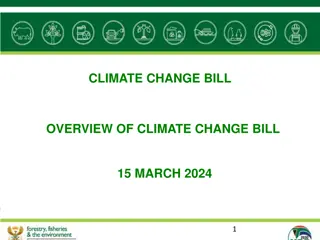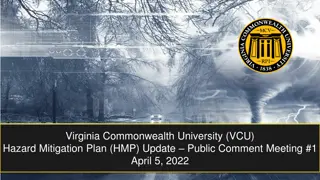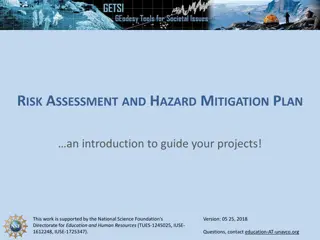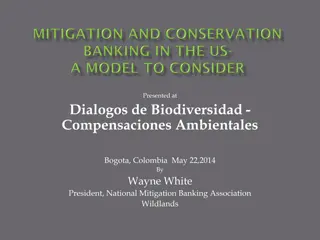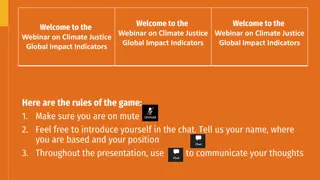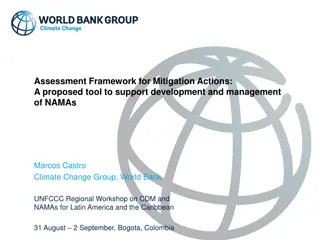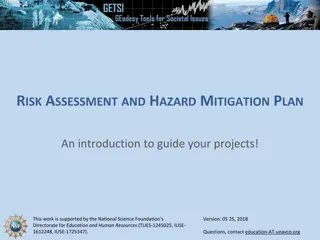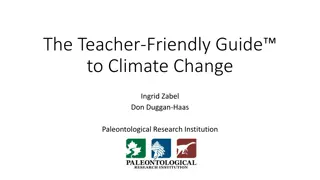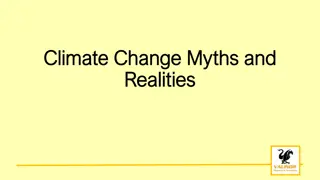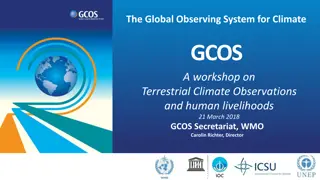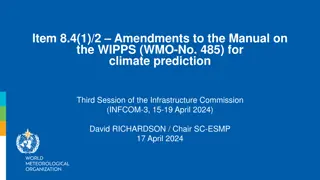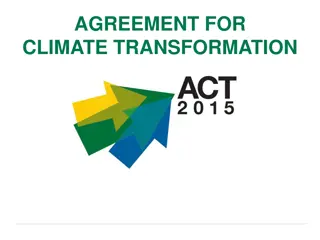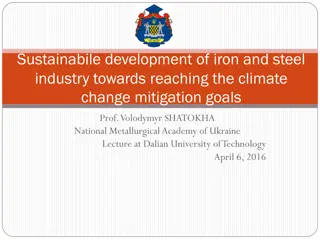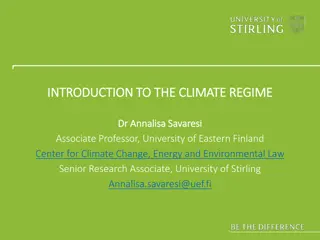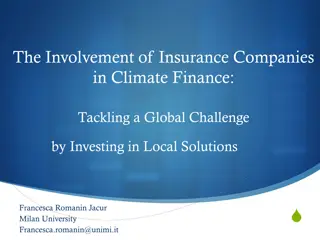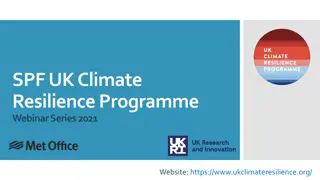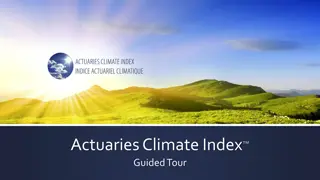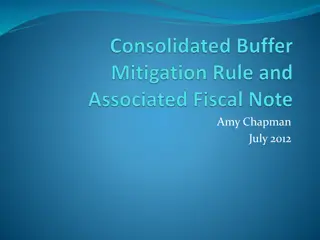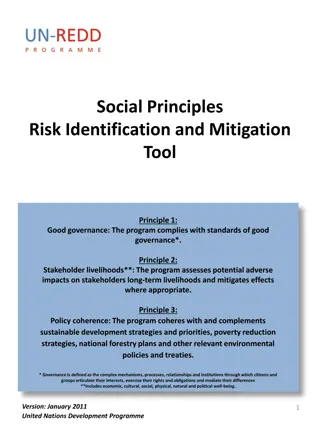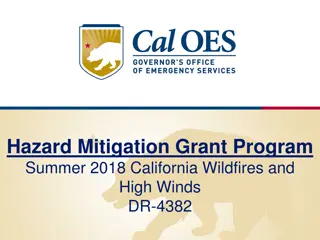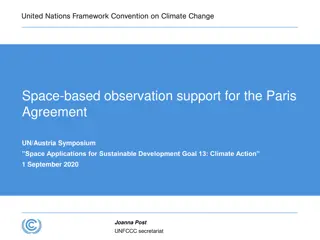Understanding Climate Change: Weather vs. Climate, Kppen-Geiger Classification, and Major Climate Zones
Explore the distinctions between weather and climate, delve into the Kppen-Geiger Climate Classification System, and discover major climate categories such as tropical climates. Gain insights into climate change and its impact on our environment.
8 views • 11 slides
Exploring Sustainability and Addressing Climate Change Challenges
Delve into the realms of sustainability and climate change, focusing on business cases, key concepts, international standards, and the urgency of mitigation and adaptation strategies. Uncover the impact of human activities on climate change, the essence of ESG factors, and proposed solutions like th
2 views • 35 slides
National Climate Change Bill Overview
The National Climate Change Bill aims to establish an effective response to climate change in South Africa, promoting a transition to a low-carbon, climate-resilient economy. It focuses on coordinated actions, adaptive capacity enhancement, greenhouse gas management, and a fair global contribution.
8 views • 21 slides
Green Transition Pillar: Shaping the Green Transition Actions
The Green Transition Pillar outlines actions to support Member States in updating national climate adaptation strategies, uptake of climate-proofing guidance, and promoting tools for climate risk assessments. It encourages the use of green budgeting, green public procurement, and disaster resilience
4 views • 9 slides
Regional Climate Modeling in CORDEX South Asia for Climate Change Research
This information details the regional climate modeling efforts within the CORDEX South Asia framework, focusing on high-resolution dynamical downscaling of CMIP5 climate projections. It highlights the activities, opportunities, and challenges for assessing regional climate change, along with future
4 views • 11 slides
Investment Responses to Biophysical Climate Impacts on Water, Energy, and Land in SDGs and Climate Policies
Investment assessments using Integrated Assessment Models (IAMs) are evolving to include biophysical climate impacts, assessing climate uncertainty on investments. The approach involves the MESSAGEix-GLOBIOM IAM, considering climate policy, SDG measures, and impacts under different scenarios. Climat
6 views • 32 slides
Gender-based Climate Change Litigation: A Key Solution?
Gender-based climate change litigation is emerging as a potential solution to address the disproportionate impact of climate change on different genders. Various international bodies have recognized the importance of integrating a gender-responsive approach in climate action to uphold human rights,
4 views • 12 slides
National Climate Change Bill Overview
The National Climate Change Bill aims to facilitate a comprehensive response to climate change in South Africa, promoting a transition to a low-carbon, climate-resilient economy. The bill outlines the purpose, objects, and principles guiding the country's approach to climate change mitigation and ad
1 views • 21 slides
Virginia Commonwealth University Hazard Mitigation Plan Update
The Virginia Commonwealth University (VCU) Hazard Mitigation Plan (HMP) Update Public Comment Meeting #1 took place on April 5, 2022. The meeting included introductions, overview of hazard mitigation planning, work plan details, data and information needs, next steps, and action items. Various commi
0 views • 20 slides
Understanding Climate Finance in Green Futures
Explore the significance of Climate Finance in Green Futures through examples from Thailand and Costa Rica. Learn about mitigation and adaptation efforts, funding sources like the Green Climate Fund, and career opportunities in this pivotal sector. Discover how Climate Finance addresses climate chan
1 views • 27 slides
Comprehensive Risk Assessment and Hazard Mitigation Planning
This work delves into risk assessment and hazard mitigation planning supported by the National Science Foundation. It covers the importance of hazard identification, risk assessment, and mitigation planning components. Mitigation actions are outlined to reduce risks to life and property, prevent dam
2 views • 20 slides
Gender and Climate Change in Agriculture: Impacts and Adaptation Strategies
This workshop explores the intersection of gender and climate change in agriculture, emphasizing the importance of considering gender dynamics in adaptation planning. It covers the effects of climate change on men and women in agriculture, reasons for gender-sensitive adaptation planning, global and
0 views • 10 slides
Regional Project Proposal to Enhance Climate Resilience in Pakistan, Mongolia, and PRC
This proposal outlines a regional project focusing on enhancing climate resilience and agricultural productivity in Pakistan, Mongolia, and the People's Republic of China (PRC). The project aims to increase access to credit for smallholder farmers, promote climate-smart agriculture technologies, and
0 views • 12 slides
Mitigation and Conservation Banks: A Comprehensive Overview
This content presents insights from Wayne White, President of the National Mitigation Banking Association, regarding the concept of mitigation/conservation banks, their evolution, benefits, agency requirements, and the principles behind their establishment. It emphasizes the importance of market-dri
0 views • 28 slides
Personal Rights in European Climate Litigation
Climate litigation in Europe focuses on individual rights and the shortcomings of traditional governance mechanisms in addressing climate change. The emergence of climate litigation as a crucial tool in governance is driven by the need to protect individuals and specific groups who are disproportion
0 views • 17 slides
Analyzing Systemic Climate Risk in the Financial Sector
This study discusses systemic climate risk in the financial sector by examining the effects of climate risks on financial institutions. It aims to design a market-based framework to assess the vulnerability of financial institutions to climate risks and analyze potential contagion effects. The frame
0 views • 39 slides
Climate Justice Global Impact Indicators Webinar - June 2023
Explore the Climate Justice Theory of Change, key definitions, impact indicators, and the importance of climate-relevant decision-making in this informative webinar. Gain insights on climate adaptation, resilience, and the effects of climate change, all aimed at empowering marginalized communities t
0 views • 27 slides
Panopticon: Complete In-DRAM Rowhammer Mitigation
Despite extensive research, DRAM remains vulnerable to Rowhammer attacks. The Panopticon project proposes a novel in-DRAM mitigation technique using counter mats within DRAM devices. This approach does not require costly changes at multiple layers and leverages existing DRAM logic for efficient miti
0 views • 17 slides
Assessment Framework for Mitigation Actions: A Tool for NAMA Development
This proposed tool supports the development and management of Nationally Appropriate Mitigation Actions (NAMAs) by providing a structured approach to assess and prioritize different mitigation programs. The tool is designed to assist developing countries, donor countries, and private investors in ev
0 views • 20 slides
National Priorities for Climate Change Science and Knowledge in Canada
Canadians are experiencing firsthand the impacts of climate change, including wildfires, heatwaves, floods, hurricanes, and droughts. To address these challenges, foundational climate change science and knowledge are essential for understanding our changing environment, identifying impacts, making i
0 views • 9 slides
Virginia Commonwealth University (VCU) Hazard Mitigation Plan Update Public Forum
Virginia Commonwealth University (VCU) is updating its Hazard Mitigation Plan to address natural, human-caused, and technological threats affecting the campus. The plan aims to lessen disaster impact, assess vulnerabilities, develop mitigation strategies, and prioritize high-risk areas. VCU's rich h
0 views • 40 slides
Risk Assessment and Hazard Mitigation Overview
This document introduces risk assessment and hazard mitigation planning, supported by the National Science Foundation. It outlines the key components of risk assessment and hazard mitigation planning, emphasizing the importance of identifying and addressing the greatest risks. The process includes h
0 views • 20 slides
Understanding Climate and Its Impact on Earth
Exploring the fundamentals of climate, this comprehensive guide covers topics such as climate zones, climate formation, atmospheric composition, the role of CO2, ocean heat absorption, and circulation patterns. From the basics of weather and seasons to the significant impact of climate change, learn
0 views • 12 slides
The Teacher-Friendly Guide to Climate Change
The Teacher-Friendly Guide to Climate Change authored by Ingrid Zabel, Don Duggan-Haas, Robert Ross, and others explores topics such as climate measurement, natural causes of climate change, historical climate perspectives, and more. It delves into the significance of understanding past climates to
1 views • 12 slides
Climate Change Myths and Realities: Debunking Common Misconceptions
This content discusses common myths surrounding climate change and provides evidence-backed realities to debunk them. Topics include the pause in warming, natural climate variability, misconceptions about climate models, the impact of CO2 on plant life, and the consensus among climate scientists. Th
0 views • 6 slides
The Global Observing System for Climate and Terrestrial Climate Observations
The Global Observing System for Climate (GCOS) plays a crucial role in observing climate-related variables globally. Established in April 1992, GCOS focuses on what, how, and where to measure, sustain measurement, manage change, data transmission, management, rescue, and access. It addresses concern
0 views • 17 slides
Amendments to WIPPS Manual for Climate Prediction at INFCOM-3, April 2024
The document discusses amendments to the Manual on WIPPS for climate prediction, including new recommendations for weather, climate, water, and environmental prediction activities. It introduces concepts such as Global Climate Reanalysis and the coordination of multi-model ensembles for sub-seasonal
0 views • 10 slides
Climate Change Litigation in Aotearoa/New Zealand: LCANZI Action and Judicial Review
The Lawyers for Climate Action NZ Incorporated (LCANZI) are actively involved in climate change litigation in Aotearoa/New Zealand, including challenging government decisions related to climate responses. A notable case involved a judicial review against Auckland Transport, where the High Court refu
0 views • 6 slides
Global Climate Transformation Agreement and Actions
Partners in the ACT 2015 initiative work towards climate transformation by aligning with the Paris Agreement's core functions to signal the inevitability of a low-carbon economy, drive global investment, and support vulnerable communities. The agreement emphasizes transparency, accountability, and e
0 views • 28 slides
Sustainable Development of Iron and Steel Industry for Climate Change Mitigation
The lecture by Prof. Volodymyr SHATOKHA discusses sustainable development in the iron and steel industry to meet climate change mitigation goals. It examines current global climate targets, the role of the industry in greenhouse gas emissions, and the feasibility of reducing emissions. The study foc
0 views • 27 slides
Understanding Weather and Climate Factors
Weather and climate are essential aspects of understanding the Earth's atmosphere. Weather refers to short-term atmospheric conditions, while climate represents long-term averages over 30 years. Factors influencing climate include distance from the equator, altitude, proximity to the sea, wind direc
0 views • 10 slides
Understanding the International Climate Regime and Governance
In this comprehensive overview, Dr. Annalisa Savaresi delves into the intricacies of the international climate regime, highlighting key aspects such as international climate law, major climate conferences like COP26, and the evolution of climate governance. The discussion covers important agreements
0 views • 27 slides
The Role of Insurance Companies in Climate Finance: Addressing Global Challenges through Local Investments
Exploring the engagement of insurance companies in climate finance, this presentation highlights the significance of private sector involvement in tackling climate change at a local level. It delves into key concepts such as mitigation, adaptation, and the global scientific targets for combating cli
0 views • 11 slides
UK Climate Resilience Programme Webinar Series 2021
The UK Climate Resilience Programme is hosting a webinar series featuring experts discussing climate resilience, adaptation strategies, and socio-economic pathways for the UK. Attendees can engage in presentations, Q&A sessions, and access recorded content post-event. Learn about the latest developm
0 views • 10 slides
Understanding the Actuaries Climate Index: A Comprehensive Guide
The Actuaries Climate Index (ACI) is an essential tool that measures climate risks using historical data collected since 1961. It focuses on extreme climate events and sea level changes, providing valuable insights into the impacts of climate change. By analyzing the ACI and its components, users ca
0 views • 18 slides
Proposed Buffer Mitigation Rules Overview
The proposed buffer mitigation rules aim to address nutrient loading by adopting alternative measures to replace lost riparian buffers. The rules include options for location of mitigation, accounting for buffer and nutrient offset, and various optional methods like coastal headwater stream mitigati
0 views • 21 slides
Social Principles Risk Identification and Mitigation Tool Overview
This document outlines the principles and minimum social standards for risk identification and mitigation in programs, focusing on good governance, stakeholder livelihoods, and policy coherence. It provides criteria for assessing risks, including policy risks and actions for mitigation at different
0 views • 15 slides
Mitigating California Wildfires: Hazard Mitigation Grant Program Overview
The Hazard Mitigation Grant Program (HMGP) aims to reduce loss of life and property from future disasters by implementing long-term risk reduction strategies. The program focuses on creating or updating Local Hazard Mitigation Plans, prioritizing post-wildfire mitigation activities, including soil s
0 views • 18 slides
Importance of Space-based Observation for Climate Action & the Paris Agreement
Utilizing space-based observation data is crucial for supporting the Paris Agreement and achieving sustainable development goals related to climate action. Observations play a key role in formulating commitments, assessing policies, and conducting research for combating climate change, as outlined i
0 views • 12 slides
Canadian Climate Change Policy from a Climate Ethics Perspective
Explore the ethical implications of Canadian climate change policy, delving into the necessity of meeting targets established in the Paris Agreement, the need for rapid decarbonization, and the availability of climate-safe energy alternatives. The presentation emphasizes the urgency of action to mit
0 views • 16 slides







